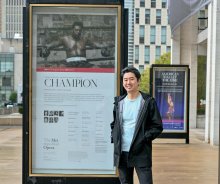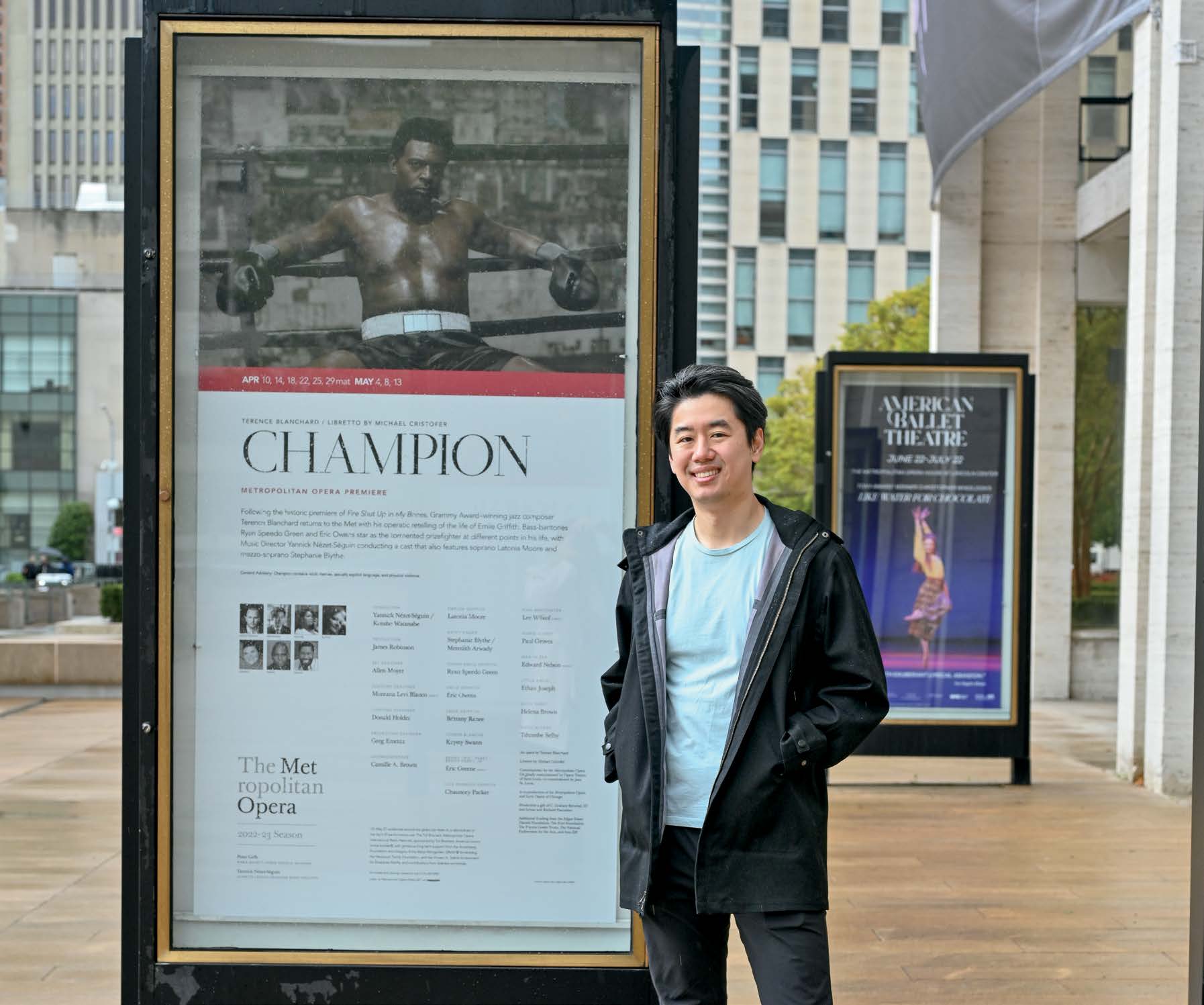
In Dec. 15, 2022, Kensho Watanabe ’02 made his Metropolitan Opera debut con-ducting Kevin Puts’ The Hours, an adaptation of Michael Cunningham’s acclaimed novel. Inspired by Virginia Woolf’s Mrs. Dalloway and headlined by world-famous prima donnas Renée Fleming, Kelli O’Hara, and Joyce DiDonato, the powerful story is about three women from different eras who each grapple with their roles in society.
This May, Watanabe returned to Lincoln Center to conduct a performance of Champion, Terence Blanchard’s jazz-infused opera about Emile Griffith, a closeted young Black prizefighter. As Watanabe described, “It’s about a real person who lived a very operatic life. It’s the kind of story that hasn’t been told on this stage before.”
Watanabe, a violinist by training, is fast becoming one of the most sought-after and versatile young American conductors. Watanabe was involved with the production of The Hours from its very early stages. Working closely with a team of artists, he helped to workshop the production at the Cincinnati Opera, and then with the Philadelphia Orchestra.
“It’s been thrilling to work with artists of such a high caliber and to witness the production at various stages of the process,” said Watanabe. “And to be able to make my debut here at the Met at the age of 35, performing a piece that I’ve gotten to know so well, I never imagined this.”
Watanabe, who lives in Paris with his wife Laëtitia Lancellotta, has guest-conducted orchestras and operas throughout the United States, Europe, and Japan. Recent highlights include his debuts with the Houston Symphony, Royal Scottish National Orchestra, Detroit Symphony, Brussels Philharmonic, and the BBC National Orchestra of Wales, as well as his Japanese debut at the Matsumoto Festival.
For much of his musical career, Watanabe has been steeped in classical music. The opportunity, however, to work with living composers who are engaged in contemporary issues is a welcome challenge.
“I love the classics, but it’s been very special to work with living composers. They are telling the stories of our time,” he said.
Like his mentor, Met Music Director Yannick Nézet-Séguin, Watanabe is equally at home in both symphonic and operatic repertoire. The two musicians have been connected since their days at the prestigious Curtis Institute of Music in Philadelphia, where Watanabe was Nézet-Séguin’s first conducting fel-low. Watanabe then served as Assistant Conductor of the Philadelphia Orchestra from 2016–2019, where Nézet-Séguin is also the Music Director. For The Hours and Champion, Watanabe was hired as part of the Met music staff to assist with the production, conducting staging, and music rehearsals. He was also contracted for one performance of each run.
“We’ve been tied together for many years,” said Watanabe. “I’ve been very fortunate to be around him for as long as I have.”
It’s hard to believe, but Watanabe didn’t always know that he wanted to be a conductor. Although he has played the violin seriously since he was a child, Watanabe entered Yale University thinking he would become a doctor and majored in biology.
“Even though I thought I was going to be a doctor, I still loved playing the violin and wanted to pursue it at the highest level possible with no plan of doing it professionally,” said Watanabe, who continued to play with orchestras and quartets while an undergraduate at Yale.
Looking back on his childhood, he said, “I really appreciate both my parents and GCDS for not forcing me to specialize too soon. At GCDS, we were encouraged to pursue both our interests and a broad range of activities.”
“I think when you have exposure to a variety of things when you’re young, your curiosity is ignited and your mind gets shaped in a certain way,” said Watanabe, who was very interested in math and science, but also loved woodshop and print-making. And although he was serious about the violin, he even tried the clarinet and had a part in a musical.
When Watanabe was 5 years old, he and his family emigrated to Greenwich from Japan. He remembers that there were not many other children like him at school. Nonetheless, he remembers how his teachers encouraged him and made him feel like a part of the community.
“My teachers will always be very dear to me,” he said.
After GCDS, Watanabe attended Horace Mann School in the Bronx while taking classes at The Juilliard School’s pre-college program every weekend.
It wasn’t until he was applying to medical school while writing his personal essay about why he wanted to become a doctor that Watanabe paused to reflect about his future. He thought he needed to give a music career a shot. His path from being a violinist to becoming a conductor has been a journey of self-discovery.
“I can’t tell you how many thousands of concerts I saw as a child with my family. I don’t think at any point I thought, I want to be that guy on the podium. What I love about conducting is not necessarily what people see from the outside.”
As a conductor, Watanabe considers himself a vessel through which music passes. “I’m able to bring people together and point them all in one direction for a short amount of time. I support the musicians in a way that allows them to play their very best and brings about a shift in the music or emotion that I feel through my experiences and study of the music. My goal is to represent the composer’s work in the best light and that requires me to be truly open to the music and the other musicians.”
Watanabe is concerned that the classical music and operatic world has been closed off for too long to too many peo-ple, and he is committed to making it accessible to a broader audience and sup-porting composers from a diversity of backgrounds.
“I want to be the spark for someone discovering this music and wanting more of it—that’s why I do what I do. If we are just performing the same pieces for the same people, we’re not really doing much for the art form,” he said.
“There’s a great opportunity for artists of my generation to make our worlds much more inviting. That doesn’t mean that we’re never going to play Brahms again. We just want to add more items to the menu.”
Watanabe is looking forward to the 2023–2024 season. In the fall, he will conduct Puccini’s Madame Butterfly at the Detroit Opera. Next May, he will return to the Metropolitan Opera to conduct a full run of The Hours.
Eventually, Watanabe would like to be a music director of an orchestra or opera house. “Right now, though, I just want to continue to learn and develop as a conductor and musician.”














.JPG&command_2=resize&height_2=85)






